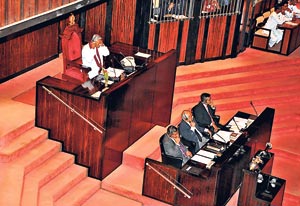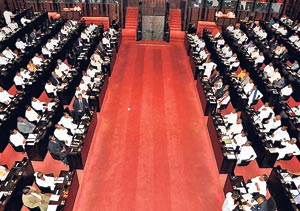There are many
activities that follow a General Election which elects people's
representatives to the
country's Legislature.
Sri Lanka's voters – those who are above 18 years of age – recently elected 196 Members of Parliament to represent them. Another
29 were nominated by the
different political parties according to the number of votes each party gained at the General Election.
The newly elected
225 Members of Parliament (shortened form MPs) attended Parliament for the first time on April 22 – the date announced for the first meeting.
Before that they were requested to come and familiarize themselves, check on where their seats would be and get their
bearings in the new
environment.
It is the general practice for Government MPs to sit on the right hand side of the Speaker while the Opposition MPs sit on the left hand side. When there is an excess of Government MPs some have to sit on the Opposition benches.
This has happened in the new Parliament since there are 144 Government
members, including the appointees on the National List, and all cannot be found accommodation on the Government side.
The election of the Speaker is the first item on the agenda on the opening day of Parliament. The Speaker is the most
important person in Parliament.
He presides over the sittings and
conducts business in Parliament. He determines which member may speak and maintains order
during the debates. He has the power to punish
members who break the rules of the House.
There have been instances when unruly members have been ordered to leave the House and when they do not obey, they are forcibly removed. Before that happens, the Speaker would suspend the sittings and allow the Sergeant-at-Arms to handle the situation.
Although a MP who is elected Speaker is a
member of a political party (generally a member of the party having a majority in the House becomes Speaker), once elected he is expected to be non-partisan and treat all MPs equally.
The Speaker does not
participate in debates nor does he vote on any issue. Of course, if there is a tie he has the option to use his vote.
Sri Lanka follows
traditions and conventions built up over a long period of time in the British Parliament. Apart from these, Standing Orders have laid down as to how business should be
conducted in the House. These are the rules that have to be followed by the MPs.
At the first
meeting of the new Parliament on April 22, Government MP Chamal Rajapaksa was unanimously elected Speaker.
The Opposition had
earlier agreed not to contest but support the Government
nominee.
This does not happen often because the Opposition also likes to show their strength and one way of doing so is to put forward a
candidate at the election of the Speaker. There was at least one occasion earlier when the Speaker was
elected without a contest. That was when Anura Bandaranaike was elected the Speaker without a
contest.
Once the Speaker is
elected, following tradition he is escorted to his chair by the proposer and seconder. Up to recent times, the Speaker wore a special garb which made him stand out among the rest of the MPs. This has now been given up.
After the election of the Speaker the MPs take their oaths or affirm to abide by the country's constitution. When the numbers were less, MPs took their oaths independently but with the numbers getting bigger, they all take the oath collectively.
The election of the Deputy Speaker (who presides over the sittings in the absence of the Speaker) and the Deputy Chairman of Committees follows.
The first day's
business then ends. A date for the next meeting is fixed when the Government's
programme of work for the year will be outlined by the Head of State. |



